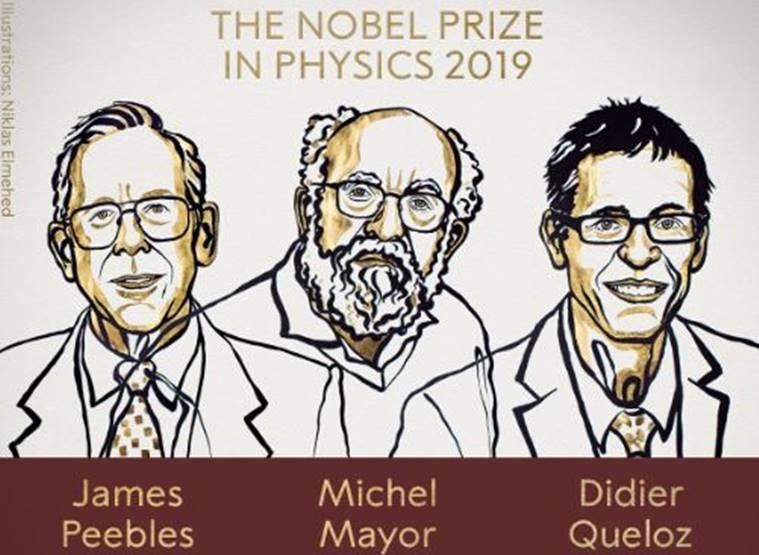Stay updated with the latest - Click here to follow us on Instagram
2019 Physics Nobel awarded to 3 scientists for discoveries in cosmology
It was awarded with one half to James Peebles “for theoretical discoveries in physical cosmology” and the other half jointly to Michel Mayor and Didier Queloz “for the discovery of an exoplanet orbiting a solar-type star.”
 The award was announced by Prof. Goran Hansson, secretary-general of the Royal Swedish Academy of Sciences that chooses the laureates. (Source: Twitter @NobelPrize)
The award was announced by Prof. Goran Hansson, secretary-general of the Royal Swedish Academy of Sciences that chooses the laureates. (Source: Twitter @NobelPrize)
The 2019 Nobel Prize in Physics was awarded Tuesday to three scientists for their contribution to the understanding of the evolution of the universe. The award was shared between the three with one half going to James Peebles “for theoretical discoveries in physical cosmology” and the other half jointly to Michel Mayor and Didier Queloz “for the discovery of an exoplanet orbiting a solar-type star.”
Watch the very moment the 2019 Nobel Prize in Physics is announced.
Presented by Göran K. Hansson, Secretary General of the Royal Swedish Academy of Sciences.#NobelPrize pic.twitter.com/T9fY4dFdo4
— The Nobel Prize (@NobelPrize) October 8, 2019
The award was announced by Prof. Goran Hansson, secretary-general of the Royal Swedish Academy of Sciences that chooses the laureates.
An exoplanet is a planet outside the solar system. Hansson credited the three for their “contributions to our understanding of the evolution of the universe, and Earth’s place in the cosmos,” news agency AP reported.
EXPLAINED | In Nobel season, recalling the world’s most prestigious honour
The prize comes with a 9-million kronor (USD 918,000) cash award to be shared a gold medal and a diploma. The laureates receive them at an elegant ceremony in Stockholm on December 10, the anniversary of the death of prize founder Alfred Nobel in 1896, together with five other Nobel winners. The sixth one, the peace prize, is handed out in Oslo, Norway on the same day.
“My advice to young people entering science: you should do it for the love of science … You should enter science because you are fascinated by it”
– newly awarded laureate James Peebles speaking at today’s press conference announcing his #NobelPrize in Physics. pic.twitter.com/JaSM10glQT
— The Nobel Prize (@NobelPrize) October 8, 2019
This was the 113th Nobel Prize in Physics awarded since 1901, of which 47 awards have been given to a single laureate. Only three women have been awarded it so far: Marie Curie in 1903, Maria Goeppert-Mayer in 1963 and Donna Strickland in 2018, according to the Nobel website.
Michel Mayor, awarded this year’s #NobelPrize in Physics, was born in 1942 in Lausanne, Switzerland.
He is a professor at the University of Geneva @UNIGEnews. pic.twitter.com/y7EhuUZs4r
— The Nobel Prize (@NobelPrize) October 8, 2019
This year, the Nobel Prizes are being announced between October 7 and 14, in the following order: October 7 (Medicine), October 8 (Physics), October 9 (Chemistry), October 10 (Literature), October 11 (Peace), October 14 (Economics).
2019 Physics Laureate Didier Queloz @DidierQueloz was born in 1966.
He is a professor at the University of Geneva @UNIGEnews and the University of Cambridge @cambridge_unihttps://t.co/2veh6D86hk#NobelPrize pic.twitter.com/N1ZvW2HBwF
— The Nobel Prize (@NobelPrize) October 8, 2019
On Monday, Americans William G Kaelin Jr and Gregg L Semenza and Britain’s Peter J Ratcliffe won the Nobel prize for Physiology or Medicine, for discovering details of how the body’s cells sense and react to low oxygen levels, providing a foothold for developing new treatments for anemia, cancer and other diseases.
The discovery by 2019 #NobelPrize laureates Michel Mayor and Didier Queloz started a revolution in astronomy and over 4,000 exoplanets have since been found in the Milky Way. Strange new worlds are still being discovered, with an incredible wealth of sizes, forms and orbits. pic.twitter.com/nqhJcJGJTv
— The Nobel Prize (@NobelPrize) October 8, 2019
Events began Monday with the award announcement for Physiology or Medicine. The Chemistry prize will be announced on Wednesday. This year’s double-header Literature Prizes will be awarded Thursday and the Peace Prize will be announced on Friday. The economics prize will be awarded in the last — on October 14.
This year’s Physics Laureates Michel Mayor and Didier Queloz have explored our home galaxy, the Milky Way, looking for unknown worlds. In 1995, they made the first discovery of a planet outside our solar system, an exoplanet, orbiting a solar-type star, 51 Pegasi.#NobelPrize pic.twitter.com/XAZ1CZD40m
— The Nobel Prize (@NobelPrize) October 8, 2019
The 2018 literature prize was suspended after a scandal rocked the Swedish Academy. The body plans to award it this year, along with announcing the 2019 laureate.
2019 #NobelPrize laureate James Peebles took on the cosmos, with its billions of galaxies and galaxy clusters. His theoretical framework, developed over two decades, is the foundation of our modern understanding of the universe’s history, from the Big Bang to the present day. pic.twitter.com/fly4alndv9
— The Nobel Prize (@NobelPrize) October 8, 2019
-With AP inputs






- 01
- 02
- 03
- 04
- 05
























